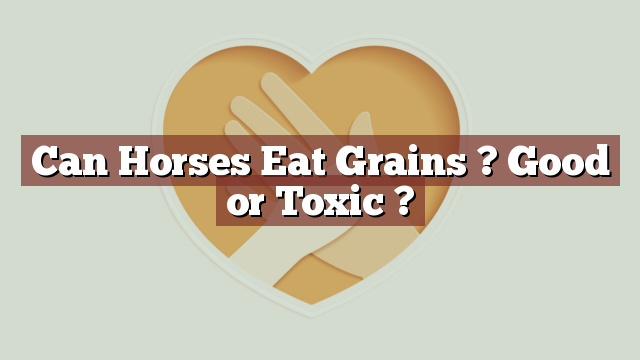Can Horses Eat Grains? Good or Toxic?
Knowing what foods are safe for our beloved animals is crucial for their overall health and well-being. Horses, being herbivores, have a specific diet that mainly consists of grasses and forages. However, there is often confusion surrounding whether horses can safely consume grains. In this article, we will explore the nutritional value of grains for horses and address the safety considerations associated with their consumption.
Nutritional Value of Grains for Horses
Grains, such as oats, barley, and corn, are rich sources of energy and nutrients for horses. They contain carbohydrates, fats, proteins, vitamins, and minerals that contribute to a horse’s overall nutritional requirements. These nutrients help to maintain proper body condition, support growth and development, and provide energy for exercise and performance. Grains can be a valuable addition to a horse’s diet when fed in appropriate amounts and balanced with other forages.
Can Horses Eat Grains? Safety and Toxicity Considerations
Can horses eat grains? Yes, horses can eat grains, but it is important to exercise caution and moderation. While grains are generally safe for horses, certain factors need to be considered. The digestive system of horses is designed to efficiently process high-fiber forages rather than concentrate feeds like grains. Feeding excessive amounts of grains can disrupt the delicate balance of the horse’s digestive system, leading to issues such as colic, laminitis, and gastric ulcers.
It is also worth noting that some horses may have specific sensitivities or allergies to certain grains. For example, oats are generally well-tolerated by horses, but some individuals may be allergic to them, resulting in adverse reactions.
To ensure the safety of feeding grains to horses, it is recommended to consult with a veterinarian or equine nutritionist. They can provide guidance on the appropriate types and quantities of grains to incorporate into a horse’s diet, taking into consideration the specific nutritional needs and health conditions of the individual horse.
Potential Risks and Benefits of Feeding Grains to Horses
Feeding grains to horses in moderation can have several benefits. As mentioned earlier, grains are a concentrated source of energy, which can be particularly beneficial for horses in heavy work or those needing to gain weight. Grains also provide essential nutrients that may be lacking in a horse’s diet, especially if they have limited access to high-quality forages.
However, it is essential to balance the benefits with the potential risks. Feeding excessive amounts of grains or feeding them improperly can lead to digestive disorders, weight gain issues, and metabolic imbalances. It is crucial to monitor a horse’s body condition score regularly and adjust their diet accordingly to ensure optimal health.
What to Do if Your Horse Accidentally Consumes Grains
If your horse accidentally consumes a large quantity of grains or exhibits any unusual symptoms after consuming grains, it is important to contact your veterinarian immediately. They will be able to assess the situation and provide appropriate guidance based on your horse’s specific circumstances. Prompt action can help prevent any potential health complications and ensure your horse receives the necessary care.
Conclusion: A Balanced Approach to Feeding Grains to Horses
In conclusion, grains can be a valuable addition to a horse’s diet when fed appropriately and in moderation. They provide essential nutrients and energy, but their consumption should be carefully monitored to avoid digestive issues and other potential health risks. Consulting with a veterinarian or equine nutritionist is highly recommended to determine the optimal feeding plan for your horse and ensure their overall well-being. By taking a balanced approach to feeding grains, we can help our horses thrive and maintain their health for years to come.
Thank you for investing your time in exploring [page_title] on Can-Eat.org. Our goal is to provide readers like you with thorough and reliable information about various dietary topics. Each article, including [page_title], stems from diligent research and a passion for understanding the nuances of our food choices. We believe that knowledge is a vital step towards making informed and healthy decisions. However, while "[page_title]" sheds light on its specific topic, it's crucial to remember that everyone's body reacts differently to foods and dietary changes. What might be beneficial for one person could have different effects on another. Before you consider integrating suggestions or insights from "[page_title]" into your diet, it's always wise to consult with a nutritionist or healthcare professional. Their specialized knowledge ensures that you're making choices best suited to your individual health needs. As you navigate [page_title], be mindful of potential allergies, intolerances, or unique dietary requirements you may have. No singular article can capture the vast diversity of human health, and individualized guidance is invaluable. The content provided in [page_title] serves as a general guide. It is not, by any means, a substitute for personalized medical or nutritional advice. Your health should always be the top priority, and professional guidance is the best path forward. In your journey towards a balanced and nutritious lifestyle, we hope that [page_title] serves as a helpful stepping stone. Remember, informed decisions lead to healthier outcomes. Thank you for trusting Can-Eat.org. Continue exploring, learning, and prioritizing your health. Cheers to a well-informed and healthier future!

